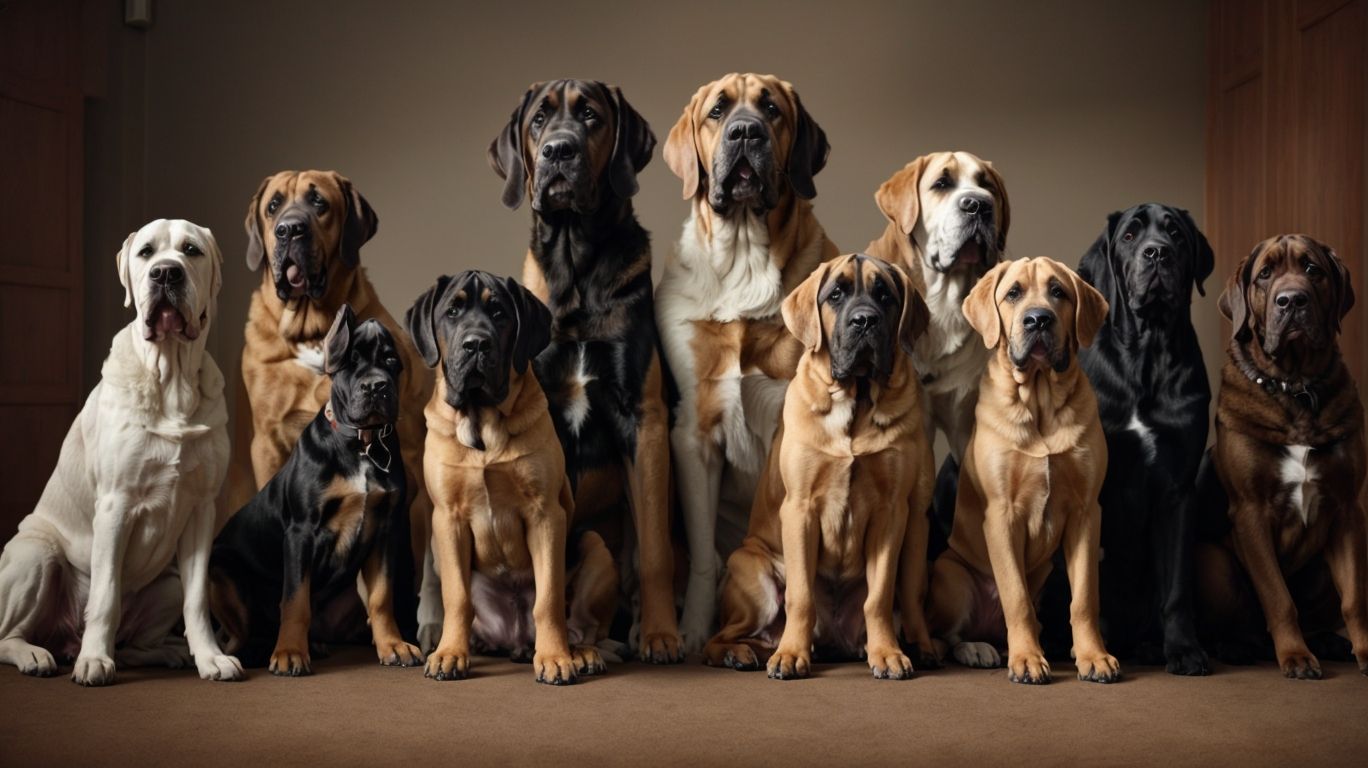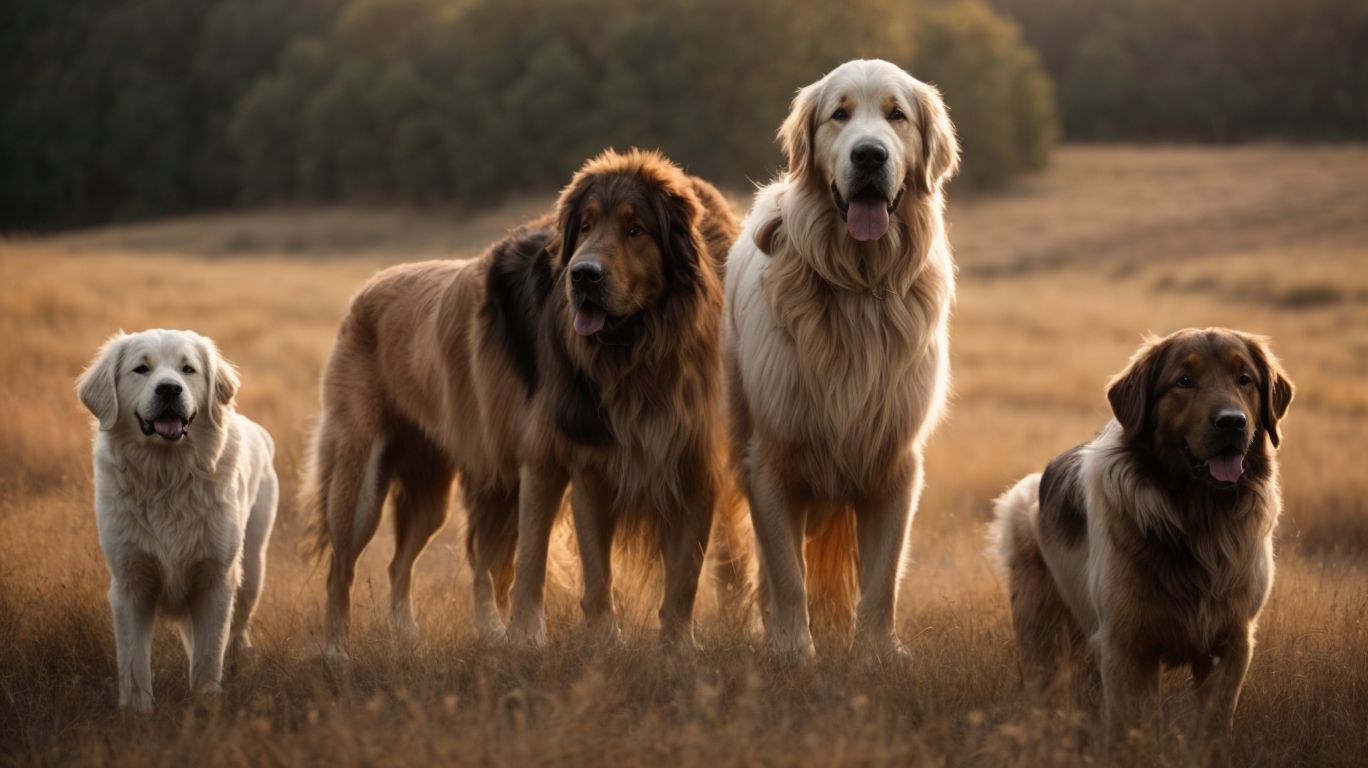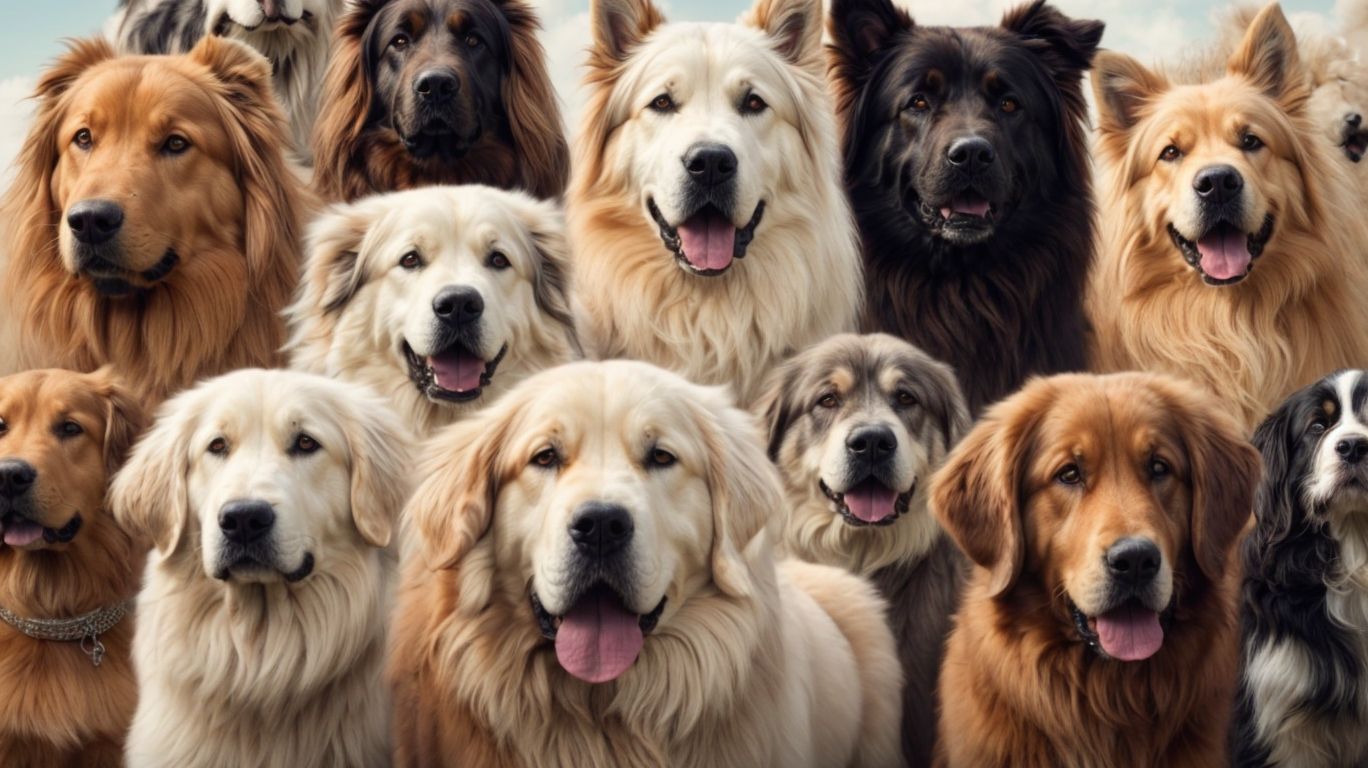
Giant Breeds with Gentle Hearts: Your Ultimate Guide
Are you considering adding a gentle giant to your family? In this ultimate guide, we will explore the world of giant breeds with gentle hearts. From popular breeds like Great Danes and Saint Bernards to the characteristics that make them such loving companions, we will cover it all.
Discover the pros and cons of owning a giant breed, as well as essential care tips to keep these big-hearted pups happy and healthy. So, grab a cup of tea and let’s dive into the world of giant breeds with gentle hearts.
What Are Giant Breeds with Gentle Hearts?
Giant breeds with gentle hearts are a unique category of dog breeds known for their massive size and loving nature.
These magnificent canines are often referred to as gentle giants due to their massive physical stature yet affectionate demeanor. Their impressive size can be intimidating at first glance, but their gentle souls and friendly disposition make them wonderful companions for those seeking loyal and loving four-legged friends.
Despite their imposing appearance, giant breeds are often described as big teddy bears who crave human companionship and excel in forming strong bonds with their owners.
In this Ultimate Guide to Dog Breeds, we will explore some of the most popular giant breeds and delve into what makes them such special pets.
What Are The Most Popular Giant Breeds?
- Among the most popular giant breeds are Mastiffs, Great Danes, Newfoundlands, Saint Bernards, Leonbergers, Irish Wolfhounds, and Bernese Mountain Dogs, each known for their unique characteristics and gentle demeanor.
Mastiffs, for instance, are known for their massive size and protective nature, making them great guard dogs, while Great Danes impress with their elegant appearance despite their gentle and friendly disposition. Irish Wolfhounds, on the other hand, are beloved for their graceful build and historical significance as ancient war hounds. Each of these giant breeds brings its own set of distinguishing features and charm to the table, captivating dog enthusiasts worldwide with their impressive stature and lovable personalities.
Great Danes
Great Danes, known for their majestic appearance and friendly disposition, have a relatively short lifespan compared to other giant breeds and may be prone to certain health issues.
These gentle giants are one of the largest dog breeds, with males typically standing around 30 inches tall at the shoulder and weighing between 140-175 pounds. Despite their imposing size, Great Danes are known for their gentle and affectionate nature, often earning them the nickname ‘gentle giants‘.
When it comes to exercise, they require regular moderate activity to keep them healthy and happy, making them suitable companions for active individuals or families. It’s crucial to monitor their diet and prevent them from overeating to prevent obesity-related health issues.
Saint Bernards
Saint Bernards are gentle giants known for their loyal and affectionate nature, requiring ample exercise and a balanced diet to maintain their health and well-being.
These magnificent dogs form strong bonds with their families, often seeking to be close to their loved ones. Due to their size and energy levels, Saint Bernards have high Exercise Needs and benefit from regular activities such as walks, hikes, and playtime. A well-structured exercise routine not only helps them stay fit but also prevents obesity and joint issues. When it comes to their Diet, it is crucial to provide them with high-quality, nutrient-rich food tailored to their size, age, and activity level.
Irish Wolfhounds
Irish Wolfhounds possess a calm and noble temperament, requiring consistent training, regular grooming, and meaningful bonding activities to thrive as loving companions.
Grooming plays a crucial role in the overall health of Irish Wolfhounds, as their dense double coat needs regular brushing to prevent matting and maintain a clean appearance.
Bonding activities, such as daily walks and interactive play sessions, are essential for creating strong emotional connections between the dog and its owner.
These large, gentle giants respond well to positive reinforcement techniques during training sessions, making it important to establish trust and mutual respect through consistent training methods.
Bernese Mountain Dogs
Bernese Mountain Dogs are known for their friendly and social nature, requiring early socialization, consistent obedience training, and regular vet check-ups to address potential health issues.
These large and gentle dogs thrive on human interaction and companionship, making socialization key to their well-being from a young age. Obedience training is crucial as they are intelligent and strong-willed, needing clear boundaries and positive reinforcement.
In terms of healthcare, regular vet check-ups are essential to monitor for common health issues like hip dysplasia and certain cancers that they may be predisposed to. By prioritizing obedience and health considerations, owners can ensure that their Bernese Mountain Dogs lead happy and healthy lives.
Newfoundlands
Newfoundlands, with their massive size and gentle temperament, need adequate exercise, proper socialization, and a spacious living environment to thrive as loving family pets.
Their large bodies require regular physical activity to stay healthy and happy. Ensuring they have space to move around freely is crucial for their overall well-being, as cramped quarters can lead to behavioral issues.
Socialization from an early age is essential for Newfoundlands to develop into well-adjusted companions. Exposing them to various people, animals, and environments helps prevent timidity or aggression. A suitable home environment with ample room for them to stretch their legs and regular opportunities to interact with others is key to nurturing their friendly nature.
What Are The Characteristics of Giant Breeds with Gentle Hearts?
Giant breeds with gentle hearts are characterized by their calm and affectionate temperament, making them ideal companions for families seeking loving and protective pets.
These dogs often display a natural affinity towards children, showcasing a gentle and patient demeanor. Their large size may seem intimidating at first, but their sweet nature and protective instincts towards their family members are truly endearing. Despite their imposing stature, they are known for being gentle giants who enjoy nothing more than lounging around the house with their human family members. Their loyalty knows no bounds, and they form strong bonds with their owners, often becoming beloved members of the family.
Calm and Gentle Temperament
Giant breeds with calm and gentle temperaments exhibit loving companionship and protective instincts, forming strong bonds with their owners and families.
These colossal canines are known for their affectionate demeanor, often preferring to be close to their loved ones. Their protective instincts shine through when they sense any potential threat, as they are quick to assess and react to keep their family safe. Despite their massive size, they have a gentle and caring nature, making them excellent choices for households with children. Their loyalty knows no bounds, and they thrive on being an integral part of the family unit.
Affectionate and Loyal
Giant breeds are known for being affectionate and loyal, forming strong bonds with their families and excelling as beloved family pets.
Their large size may seem intimidating at first, but giant breeds often have gentle and loving dispositions, making them wonderful companions for families of all sizes. Their loyalty knows no bounds, and they are known to be fiercely protective of their loved ones.
Despite their imposing presence, these dogs have a knack for sensing their family’s emotions and providing comfort when needed. That deep bonding capability makes them not just pets, but integral members of the family unit.
Easy to Train
Giant breeds are generally easy to train, responding well to positive reinforcement techniques and consistent guidance from their owners.
These large dogs often have a strong desire to please their owners, making them eager learners when training with positive reinforcement. By using rewards such as treats, praise, and playtime, owners can motivate these breeds to follow commands and behaviors successfully.
Consistency is key when training giant breeds, as they thrive on routines and clear boundaries. Incorporating fun and interactive training sessions can keep them engaged and focused, helping them to retain what they have learned. Patience and understanding are crucial when working with these intelligent and loyal dogs, ensuring a strong bond between them and their owners.
Good with Children and Other Pets
Giant breeds are typically good with children and other pets, thriving in social settings and enjoying playtime with their human and animal companions.
Encouraging socialization from an early age is key to ensuring that giant breeds develop positive relationships with kids and other animals. By exposing them to different situations and people, these gentle giants learn proper behavior and grow more confident in diverse settings.
Regular playtime not only keeps them physically and mentally stimulated but also strengthens their bonds with family members, creating a harmonious environment where everyone can coexist happily. Incorporating structured play sessions into their routine fosters a sense of fun and unity, cementing the heartwarming connection between giant breeds and their loved ones.
What Are The Pros and Cons of Owning a Giant Breed?
Owning a giant breed comes with numerous pros, including great companionship and protection, but there are also cons such as high maintenance and potential health issues to consider.
- Large dog breeds, such as Saint Bernards and Great Danes, offer unparalleled loyalty and make fantastic family pets due to their gentle nature.
- Their size alone serves as a deterrent to potential intruders, providing a sense of security.
- The upkeep of giant breeds requires significant resources – from food expenses to grooming needs.
Giant breeds are prone to certain health conditions like hip dysplasia and bloat, which can lead to costly vet bills and require careful monitoring throughout their lives.
Pros:
The pros of owning giant breeds include their role as loving companions and family pets, providing unwavering loyalty and affection to their owners.
These giants not only bring a sense of security and protection to households but also serve as excellent playmates for kids, often being gentle and patient with younger family members. Their size also means they can handle roughhousing and energetic play, making them ideal additions to an active family dynamic. Their affectionate nature extends beyond just their immediate family, as they are often sociable and friendly with visitors, spreading joy and warmth wherever they go.
Cons:
Despite their many positives, owning giant breeds comes with challenges such as potential health issues and the need for regular grooming to maintain their well-being.
Giant breeds are susceptible to various health concerns, including issues like hip dysplasia, bloat, and heart problems, which can result in high veterinary bills and a shorter lifespan. Regular grooming is essential for these immense dogs, as their thick fur requires constant brushing to prevent matting and maintain a healthy coat. Keeping their nails trimmed and ears cleaned is crucial to avoid infections and discomfort. The sheer size of giant breeds can make grooming a time-consuming task, requiring dedication and patience from their owners to ensure their furry companions stay happy and healthy.
How To Care for Giant Breeds with Gentle Hearts?
Caring for giant breeds with gentle hearts involves providing proper nutrition, regular exercise, grooming, socialization, and routine vet visits to ensure their well-being.
- Nutrition for these large dogs is crucial; feed them a high-quality, balanced diet tailored to their size and activity levels.
- When it comes to exercise, remember that moderation is key; avoid excessive strain on their joints.
- Grooming should not be overlooked; brush their coat regularly to prevent matting and keep their skin healthy.
- Socialization from an early age helps them develop good manners.
- Prioritize regular vet visits to monitor their health and catch any issues early on.
Proper Nutrition and Exercise
Ensuring proper nutrition and exercise is essential for giant breeds, helping them maintain a healthy weight and overall well-being.
Giant breeds, such as Great Danes and Saint Bernards, have specific dietary requirements and exercise needs due to their large size and rapid growth rate. Weight management is crucial for these breeds to prevent obesity-related health issues such as joint problems and heart disease. By providing a balanced diet rich in high-quality proteins, healthy fats, and essential nutrients, coupled with regular exercise that is suitable for their size and breed, owners can help their giant companions stay fit and active.
Regular Grooming
Regular grooming is vital for giant breeds to promote good hygiene, prevent matting, and maintain optimal joint health.
When grooming giant breeds, it’s important to pay special attention to their coats, which can be prone to tangling and trapping dirt if not regularly brushed. This can lead to skin irritations and even infections if left unchecked.
By maintaining a consistent grooming routine, you can also inspect their joints for any signs of swelling or discomfort, allowing for early detection of potential joint issues. Incorporating gentle exercises during grooming sessions can also help to improve their joint flexibility and overall mobility.
Grooming plays a crucial role in ensuring the well-being and comfort of your beloved giant breed companion.
Socialization and Training
Socialization and training are key aspects of caring for giant breeds, helping them overcome behavioral challenges and develop positive relationships with humans and other animals.
Proper socialization from a young age plays a crucial role in ensuring that giant breeds grow up to be well-adjusted and friendly companions. By exposing them to various environments, people, and situations, these dogs learn to adapt and feel comfortable in diverse settings.
Consistent training reinforces good behavior, teaching them commands and boundaries that are essential for their safety and the harmony of the household. Building a strong bond through training also fosters trust and mutual understanding between the dog and its owner, laying the foundation for a fulfilling and enriching relationship.
Regular Vet Visits
Regular veterinary visits are essential for giant breeds to receive preventative care, vaccinations, and screenings to ensure early detection of any health issues.
During these routine check-ups, veterinarians can also provide valuable guidance on nutrition, exercise routines, and potential genetic disorders that are more common in larger breeds.
Preventative care measures, such as heartworm prevention and parasite control, can be discussed and implemented to keep your furry companion healthy and happy.
Staying up-to-date on vaccination schedules is crucial to protect your giant breed dog from infectious diseases that can be especially harmful due to their size and susceptibility.
Additional Resources for Giant Breed Owners
For giant breed owners seeking further information and support, there are various resources available, including breed-specific clubs, online forums, and veterinary guidance on managing common health concerns.
These resources can be instrumental in helping owners navigate the unique challenges that come with caring for such large and majestic animals.
Connecting with other giant breed enthusiasts through forums and clubs can provide a sense of community and shared experiences.
To address health concerns specific to giant breeds, it is crucial to stay informed and work closely with a trusted veterinarian who has expertise in managing issues like joint problems, heart conditions, and proper nutrition for maintaining a healthy weight.
Giant Breed Clubs and Communities
Joining giant breed clubs and online communities can offer valuable support, socialization opportunities, and access to experienced owners who understand the specific needs of these large and lovable dogs.
Engaging with such clubs not only provides a platform to connect with like-minded individuals who share a passion for giant breeds but also allows for the exchange of tips, tricks, and stories that can enrich your journey as a giant dog owner.
The social aspect of these communities fosters a sense of camaraderie and belonging, creating a supportive network that can be comforting and informative, especially for those navigating the unique challenges that come with owning a large breed dog.
Health Maintenance Guides for Giant Breeds
Understanding the health maintenance requirements of giant breeds is crucial for ensuring their long-term wellness, with preventative care measures, regular check-ups, and proper nutrition playing key roles in their overall health.
- Regular exercise is also important for giant breeds to help maintain a healthy weight and prevent joint issues.
- Providing appropriate veterinary care, such as vaccinations and parasite prevention, is essential for their well-being.
- Monitoring their food intake and avoiding overfeeding is vital to prevent obesity, which can lead to various health problems.
Implementing a balanced diet rich in high-quality protein, healthy fats, and essential nutrients will support their immune system and promote longevity. Taking proactive steps in their health maintenance can significantly enhance the quality of life for giant breed dogs.
Training Workshops and Classes for Giant Breeds
Participating in training workshops and classes specifically designed for giant breeds can enhance their obedience, social skills, and behavioral training, fostering a harmonious relationship between these gentle giants and their owners.
These specialized programs cater to the unique needs of large breeds, focusing on skills that are essential for their well-being and interaction with the environment. Through structured activities and positive reinforcement techniques, giant breeds can learn impulse control, strengthen their responsiveness to commands, and improve their overall manners.
The socialization opportunities provided in these training workshops help broaden their exposure to different stimuli, reducing the likelihood of fear or aggression in new situations. This comprehensive approach not only benefits the dogs but also equips owners with effective communication strategies to better understand and connect with their furry companions.
Nutrition and Diet Plans for Giant Breeds
Developing tailored nutrition and diet plans for giant breeds is essential to support their growth, maintain optimal weight, and address specific dietary requirements unique to these large and gentle-hearted companions.
Due to the unique physiology and size of giant breeds, such as Great Danes, Saint Bernards, and Mastiffs, their nutritional needs differ significantly from smaller breeds. Customized nutrition plans play a crucial role in preventing issues like obesity and joint problems, common in larger dogs. These plans consider factors like calorie intake, protein levels, and essential nutrients to support their overall health and vitality. By incorporating weight management strategies and following specific dietary guidelines, giant breeds can thrive and enjoy a longer, more active life.




No Comments